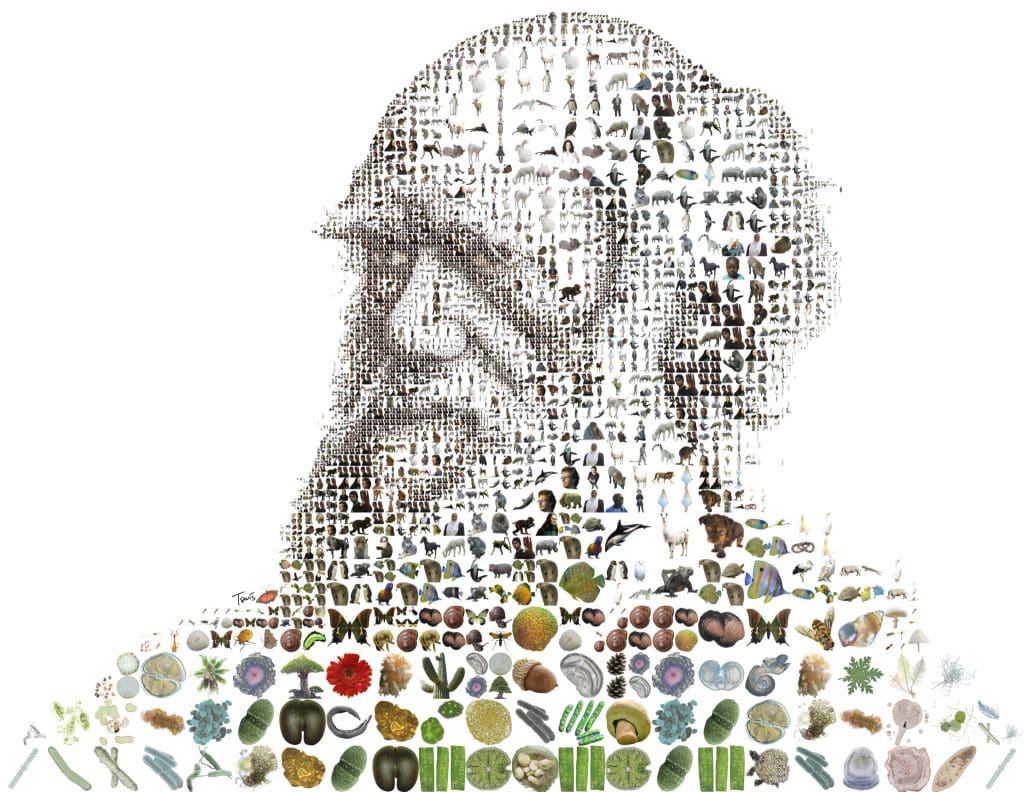
What’s in a name? Does Darwin hinder the acceptance of evolution?
By Daniel Kuebler

For nearly 35 years, Gallup has polled Americans regarding their views on human evolution using a polling question that gives respondents three options to choose from regarding human origins. Surprisingly, the results of the survey question remained relatively steady over time. Since 1982, the percentage of Americans that believe God created humans in their present form within the last 10,000 years has remained relatively stable at just over 40%. The percentage of Americans who believe humans have evolved over millions of years but God guided the process, has consistently been in the mid-30s over that period, while the percentage of those that hold God had no part in the evolution of humans has gradually risen from 9% in 1982 to 19% in 2014.
While these numbers suggest that the educational efforts of a variety of scientific organizations have borne little fruit in moving the needle regarding popular belief in human evolution, they tend to shed little light on the reasons why so many Americans hold such a skeptical view of human evolution. While the survey question is useful to see trends over time, it is an extremely blunt instrument, forcing respondents into three relatively ambiguous baskets. For example, young earth creationists are lumped together with those that are amenable to evolutionary theory in general but are skeptical when it comes to human evolution. Both groups would choose the same response option, “God created humans pretty much in their present form sometime within the last 10,000 years or so,” despite their different opinions.
In addition, there is an assumption that those who are picking this category do so because of their religious beliefs. Articles on the survey always classify these respondents as Creationists, but it is clearly a broader category. Those that are skeptical of human evolution may hold this position due to religious reasons, scientific concerns, or cultural biases. While a related Pew survey found that 64% of white Evangelical Protestants in America believe that humans have existed in their present form since the beginning of time, the reasons behind this belief are likely more complex than simply a literal interpretation of the first chapters of Genesis.
One of the broader cultural issues affecting the acceptance of human evolution is the term Darwinism, and the atheistic associations that have become attached to the term. In the United States, these associations run deep. In fact, the historian Edward Larson argued that in the 1920s:
“No idea split the modernists from the Fundamentalists more than the Darwinian theory of human evolution—and the rift was aggravated by the seeming rise in agnosticism among the cultural and scientific elite” (Larson, 2007).
The association of Darwinism with an agnostic-elite, and the accompanying fundamentalist backlash toward Darwinism, continues to lead many to see Darwinism as synonymous with an atheistic philosophy, which strips mankind of any sense of purpose or teleology and reduces him to a purely material being.
To address the effect the term Darwinism might have on the acceptance of evolution, and to assess the reasons animating those who oppose human evolution, we surveyed 130 college science students at a religiously orthodox Catholic University regarding the compatibility of evolution and their faith beliefs. These students had very high religious faith scores as measured by both the Duke University Religion Index and the Santa Clara Strength of Religious Faith Questionnaire making them a good population in which to investigate these questions.
In analyzing the survey results, there were three major items that became evident. The first was that the students had more adverse reactions toward the term Darwin than they did toward evolution. The second was that a significant number were ignorant regarding the details of evolutionary theory, as they gave answers that were scientifically inconsistent. The third, and probably the most interesting point, is that many who opposed human evolution found evolution in general to be compatible with their religious faith. Further teasing apart the rationales behind this position will require follow up surveys.
In the case of the term Darwin, 52% of the students responded that Darwinism was in conflict with their religious beliefs. This extremely high number stands in stark contrast to the mere 10% that responded that evolution was in conflict. Now it is possible that these students would react adversely to any “ism” term, lumping Darwinism in with Scientism or Marxism or any other “ism” with which they are philosophically uncomfortable. To address this possibility, the question was asked differently in an earlier portion of the survey. Students were asked to rate, on a scale of 1 to 4, with 4 being the most incompatible, if evolution driven primarily by Darwinian selection was compatible with their faith beliefs. When it came to Darwinian selection, the students gave an average rating of 2.5. Students were also asked to rate the compatibility of evolution driven primarily by natural selection. Surprisingly, students rated natural selection more favorably; the average response was 1.9. Whenever Darwin was added to a question about evolution, whether it was Darwinism or Darwinian selection, we found more resistance from a religious audience.
This discrepancy between the response to Darwinian selection and natural selection illustrates the second take away from the survey: many of the respondents are uninformed when it comes to the details of evolutionary theory. Given that Darwinian selection and natural selection refer to the same mechanism, the fact that they elicit significantly different responses indicates that something else is at play. The respondents are likely associating some anti-religious philosophical baggage with the term Darwin, although follow up would be needed to identify the exact reason for the discrepancy. This disconnect was also evident in the fact that nearly 20% of the respondents who indicated Darwinism was in conflict with their religious beliefs, replied that evolution driven by random mutations was not.
This brings us to the final point regarding what exactly is driving people’s resistance to human evolution. Using the Gallup question in our survey, we found that 25% of the respondents believe that humans were created pretty much in their present form within the last 10,000 years. Of these respondents, it turns out that 70% did not see evolution as in conflict with their faith beliefs. This was a surprisingly high number and seems counterintuitive given the high religious scores of the survey participants. There are two likely explanations for this discrepancy. The first is that these respondents do not have an issue with the evolution of other life forms but maintain that humans are distinct and set apart from the evolutionary process for religious or philosophical reasons. (There is a significant strain within Catholic theological writings, particularly from the late 19th and early 20th century, that argued this position and the effects are likely still evident today.)
The second, and I believe less likely scenario, is that these respondents have assessed the scientific evidence for human evolution to be weak even though they have no philosophical problem with human evolution in general. The reason I believe this is unlikely is that it presupposes a level of competence regarding the science of evolution that was clearly lacking in a large number of survey participants. Despite this, one cannot rule out this possibility.
It will be important in future surveys to tease apart these two possibilities, as each suggest a different type of engagement and dialogue to pursue. For example, if most of those who believe humans were created within the last 10,000 years hold this view because of theological and philosophical reasons, it would bear more fruit initially to engage and address those arguments, rather than to present a scientific case for human evolution. In fact, given the negative response to the term Darwin that we saw in our survey, it seems likely that philosophical associations and connotations are what drive the resistance to evolution. It seems then that this would be the level at which to begin the dialogue with those skeptical regarding human evolution or evolution in general.
Dr. Daniel Kuebler is Professor of Biology at Franciscan University of Steubenville (USA) and has published a variety of scientific and popular articles on evolution, faith and science. He has co-authored a book examining different schools of thought on evolution entitled The Evolution Controversy: A Survey of Competing Theories.

